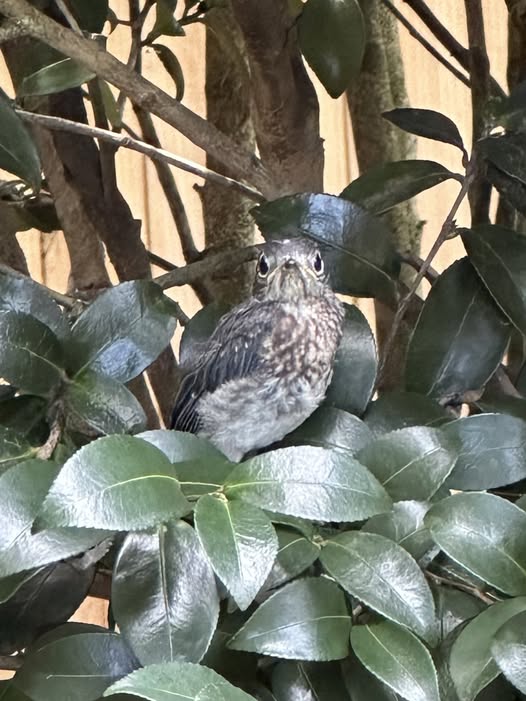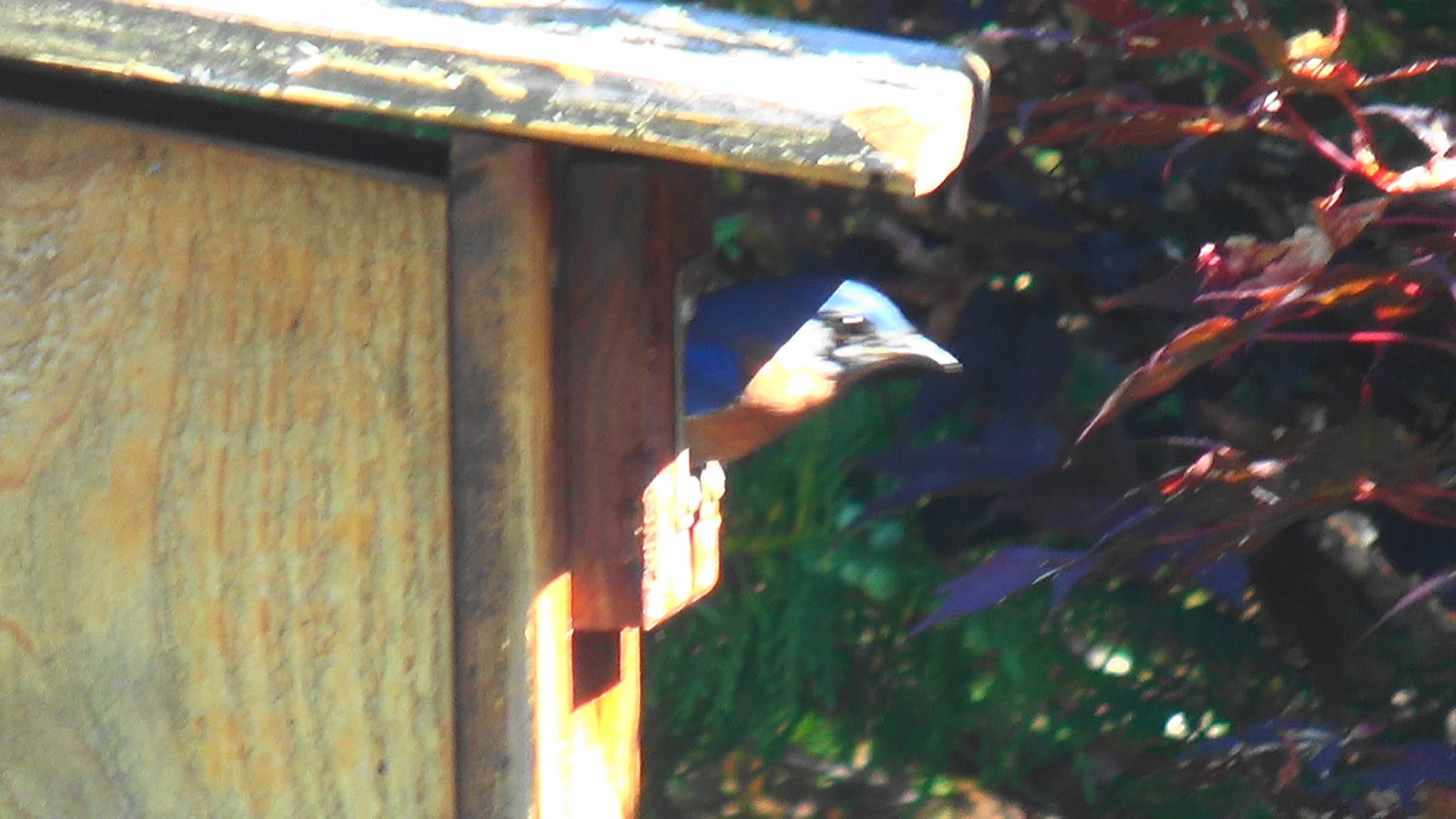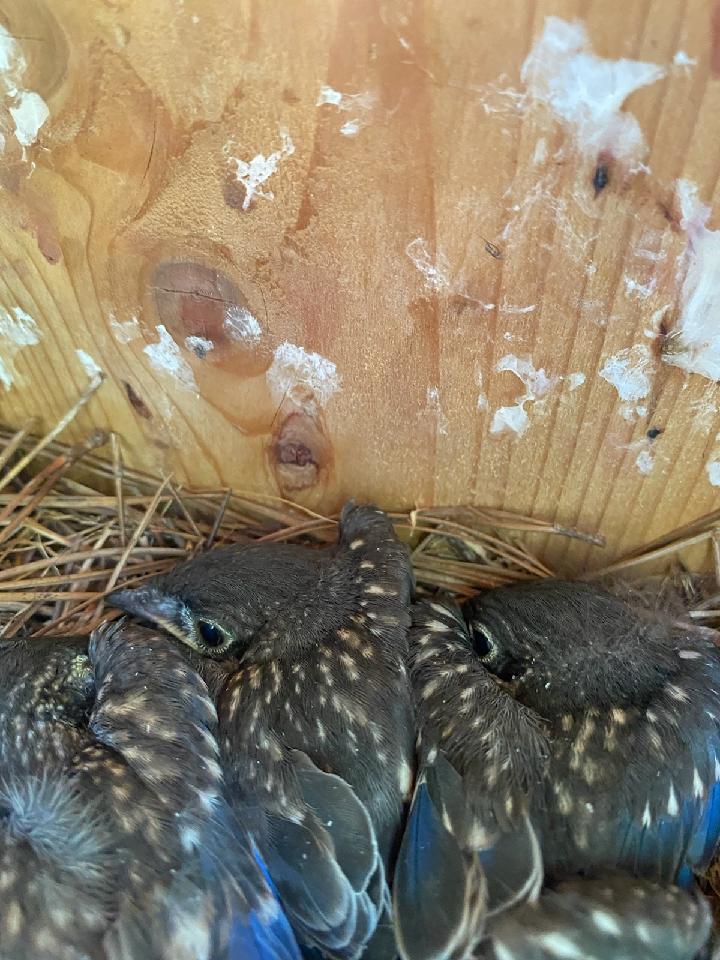Bluebirds
Chronicles from spring 2021 and 2025
2021 was a good year for the bluebirds. Unfortunately, it wasn’t as good for us - COVID took my dad that year, and I couldn’t bring myself to write their story then. But this spring, in 2025, I’d like to share two other bluebird stories: one from Hilda Chambers Young in Alabama, and another from Sue’s Olive Branch Heaven.
Bossy and Bluey
Bluey was a gentle fellow — feathers the color of summer twilight, with faint white brushstrokes upon his wings like the last touch of daylight on cloud edges. Bossy, his bold-hearted mate, was his opposite: the true keeper of their little kingdom. She ruled the fence line and the windows, tapping her mirrored rival with a furious rhythm that startled cats and children alike. She was the flame that held the skybird in her orbit.
Together, they had filled that wooden box with life, season after season. Nine young had come from their labor that year already — each one a drop of blue sky given shape and breath.
By June, they had begun again. Bossy’s belly grew round with new promise, and Bluey sang from the post each morning, as though the air itself might bless their third brood.
But one day, Bluey did not come back.
For a time, Bossy called. Her cry was sharp, desperate, and tender — a sound that passed through leaves and settled in the human heart.
She looked from wire to tree to rooftop, her bright eyes flashing with refusal.
Yet the sky gave no answer, and the silent hawk’s shadow moved like fate across the grass.
Still, she would not quit. There were four pale eggs beneath her, and something fierce within her
that would not die. Days later, another male came — young, uncertain, his blue dull and untested.
Somehow, Bossy allowed him near.
erhaps she saw in him only the faint echo of the one she’d lost,
or perhaps she simply knew the ancient rule of survival: life must continue.
Three of her eggs broke open, one by one, releasing small trembling hearts to the world.
Bossy brooded them through the warm nights, feathers close, eyes half-shut in the labor of love.
On the third night, the yard grew still. No tap on the window. No song at dawn. Bossy, too, was gone.
The young male stayed. Awkward and bewildered, he carried his gifts — grasshoppers too large,
beetles too hard — and laid them at the tiny open mouths that gaped for something softer,
smaller, easier to swallow. His inexperience was pitiful and pure.
At night he perched above the nest box, feathers fluffed against the dark,
watching but unable to warm the fragile bodies below.
Two of the nestlings faded quietly, their breaths slipping back into the night from which they had come.
But one — a small, determined pulse of blue — held on.
The young male learned, slowly, painfully.
With the help of the hand that offered mealworms from the house, he began to feed better.
And somehow, the last little one endured, growing feathers like soft dawn and courage like its mother’s.
On the nineteenth day, the nest was empty.
A fledgling darted through the camellias, flashing blue among pink blossoms.
The stepfather followed close behind — protective now, proud perhaps —
and together they vanished into the green distance.
Sometimes, when the wind is soft and the yard hums with bees,
a bit of blue still flickers in the corner of sight. A flutter near the feeder. A memory in motion.
The whistle sounds, and though no wings answer, the air seems to pause — as if listening.
So ends the season of Bossy and Bluey: a love shaped by sky, shadowed by loss, but never undone.
For even in the quiet box beneath the shade umbrella, there remains the echo of their song —
two small, steadfast hearts that once made the world a little more blue, and a little more brave.
Olive Branch Heaven
A midsummer saga, complete with peril, devotion, and a most glorious ending.
One gray morning, between spells of endless rain, Terry went to check Sue's front box named Olive Branch Heaven. The garden shimmered with wet leaves and the sweet scent of damp olive branches. The world felt hushed, like it was holding its breath — and so was Terry when she peeked inside. There was the mother, steadfast and bright-eyed, sitting so still upon her nest. B ut beneath her — horror of horrors — the interior was alive with ants. Ants and their pale larvae, threading through the grass and moss, crawling over her feathers, swarming the eggs. Who knows how she endured it. She must have been bitten, and yet she would not abandon her fragile promise of life. It had been raining for days — the kind of slow, saturating rain that drives creatures from their burrows. No doubt the ants had been flooded from the ground and had followed the dry echo of the box’s wooden heart, thinking it safe. Terry had Marley with her — she stood at her knee, ears up, sensing her alarm. There was nothing for it but action. Terry left the door ajar, dashed back to Frank’s to drop Marley off, ran home through the drizzle for the bluebird kit and the diatomaceous earth, then hurried back — a bit breathless, rain in her hair, heart in her throat. The mother bird had flown when she returned. Terry lifted the nest carefully, set it on the grass, and brushed out the swarming ants from the box. Then came the delicate work: tipping each tiny egg from its ant-clung cradle, brushing them gently free, flipping the nest, spraying beneath, and then, with the lightest hands I could manage, setting them back where they belonged. When I replaced the nest, I confess I worried — that I’d done too much, or not enough, or simply that the odds had tilted against these fragile hearts. But nature, bless her mercy, had other plans. Days later, when Terry came back to check, there they were — four bright, hungry nestlings, beaks agape, their voices trembling the air. Each day they grew stronger, their feathers bluer, their eyes deeper with that wild knowing that comes just before flight. And then, one afternoon, they were gone — not lost, but "risen", now among the branches, the sky their new roof, Olive Branch Heaven echoing with their songs. Terry, their godmother, helped save them. And the care Sue had given this place — all its native blooms and buzzing corridors of life — made a sanctuary worth fighting for. All’s well again in Olive Branch Heaven. The olive leaves shine silver in the morning wind, and the air hums with bees and small wings.


Bluebird peeking out of the nest box, May 14

Getting ready to fledge